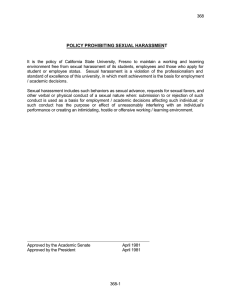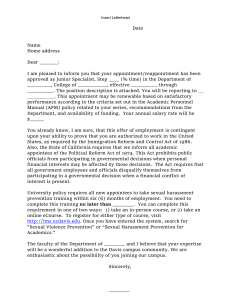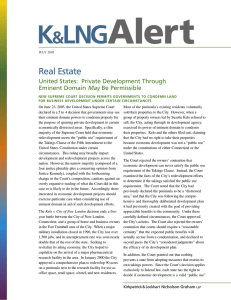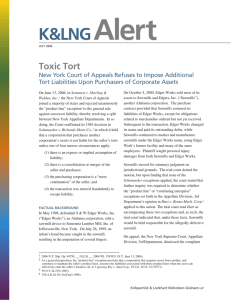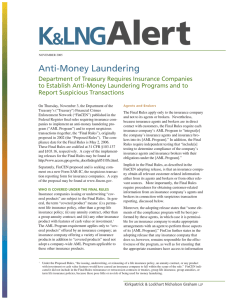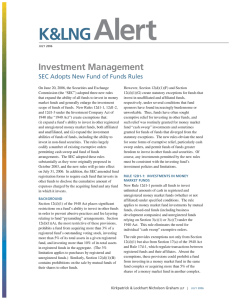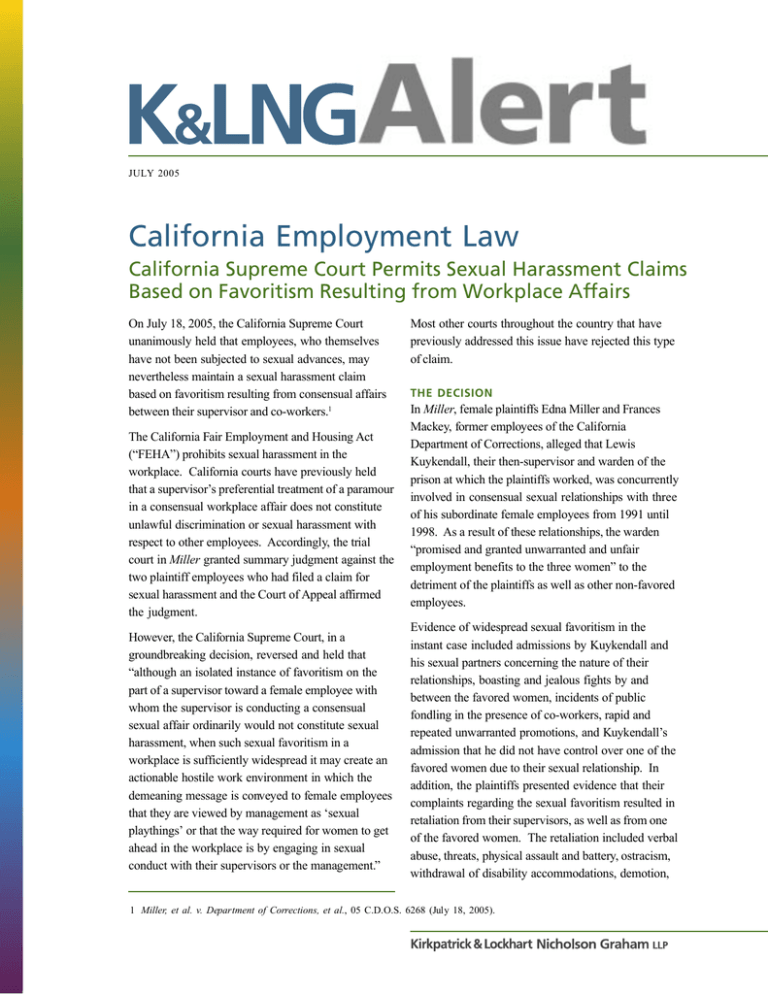
JULY 2005
California Employment Law
California Supreme Court Permits Sexual Harassment Claims
Based on Favoritism Resulting from Workplace Affairs
On July 18, 2005, the California Supreme Court
unanimously held that employees, who themselves
have not been subjected to sexual advances, may
nevertheless maintain a sexual harassment claim
based on favoritism resulting from consensual affairs
between their supervisor and co-workers.1
The California Fair Employment and Housing Act
(“FEHA”) prohibits sexual harassment in the
workplace. California courts have previously held
that a supervisor’s preferential treatment of a paramour
in a consensual workplace affair does not constitute
unlawful discrimination or sexual harassment with
respect to other employees. Accordingly, the trial
court in Miller granted summary judgment against the
two plaintiff employees who had filed a claim for
sexual harassment and the Court of Appeal affirmed
the judgment.
However, the California Supreme Court, in a
groundbreaking decision, reversed and held that
“although an isolated instance of favoritism on the
part of a supervisor toward a female employee with
whom the supervisor is conducting a consensual
sexual affair ordinarily would not constitute sexual
harassment, when such sexual favoritism in a
workplace is sufficiently widespread it may create an
actionable hostile work environment in which the
demeaning message is conveyed to female employees
that they are viewed by management as ‘sexual
playthings’ or that the way required for women to get
ahead in the workplace is by engaging in sexual
conduct with their supervisors or the management.”
Most other courts throughout the country that have
previously addressed this issue have rejected this type
of claim.
THE DECISION
In Miller, female plaintiffs Edna Miller and Frances
Mackey, former employees of the California
Department of Corrections, alleged that Lewis
Kuykendall, their then-supervisor and warden of the
prison at which the plaintiffs worked, was concurrently
involved in consensual sexual relationships with three
of his subordinate female employees from 1991 until
1998. As a result of these relationships, the warden
“promised and granted unwarranted and unfair
employment benefits to the three women” to the
detriment of the plaintiffs as well as other non-favored
employees.
Evidence of widespread sexual favoritism in the
instant case included admissions by Kuykendall and
his sexual partners concerning the nature of their
relationships, boasting and jealous fights by and
between the favored women, incidents of public
fondling in the presence of co-workers, rapid and
repeated unwarranted promotions, and Kuykendall’s
admission that he did not have control over one of the
favored women due to their sexual relationship. In
addition, the plaintiffs presented evidence that their
complaints regarding the sexual favoritism resulted in
retaliation from their supervisors, as well as from one
of the favored women. The retaliation included verbal
abuse, threats, physical assault and battery, ostracism,
withdrawal of disability accommodations, demotion,
1 Miller, et al. v. Department of Corrections, et al., 05 C.D.O.S. 6268 (July 18, 2005).
reduced pay, and deprivation of eligibility for
promotion. The plaintiffs’ co-workers were aware of
the sexual favoritism and the retaliation suffered by
the employees who had complained about the
conduct.
The California Supreme Court reviewed an Equal
Employment Opportunity Commission policy
statement examining sexual favoritism 2 and the broad
standards for sexual harassment adopted in earlier
California cases. The Court concluded that both male
and female employees may establish a claim of sexual
harassment under the FEHA “by demonstrating that
widespread sexual favoritism was severe or pervasive
enough to alter his or her working conditions and
create a hostile work environment.” The Court further
concluded that, given the facts of the instant case, “a
hostile work environment was shown to have been
created by widespread favoritism” which resulted in
“an atmosphere that was demeaning to women.” The
Court also stated that “an atmosphere that is
sufficiently demeaning to women may be actionable
by both men and women.”
IMPACT ON EMPLOYERS
The Court noted that “the presence of mere office
gossip is insufficient to establish the existence of
widespread sexual favoritism.” Furthermore, a
supervisor’s isolated preferential treatment of his or
her consensual sexual partner is unlikely to give rise
to a claim of sexual harassment. In Miller, the
evidence of sexual favoritism and its detrimental
effect on non-favored employees was considerable.
Nevertheless, employers should consider taking steps
to minimize the risk of such claims by carefully
reviewing their harassment and fraternization policies.
Employers may also consider instituting policies
specifically prohibiting favoritism or perceived
favoritism based on sexual relationships and promptly
investigating any complaints of sexual favoritism.
Please contact any K&LNG Employment lawyer if
you would like additional information or advice on
this issue.
Christopher J. Kondon
310.552.5034
ckondon@klng.com
Myra B. Villamor
310.552.5068
mvillamor@klng.com
If you have questions or would like more information about K&LNG’s
Employment and Labor practice, please contact one of our lawyers listed below:
2 Office of Legal Counsel, Policy
Guidance on Employer Liability
Under Title VII for Sexual
Favoritism (Jan. 12, 1990) No.
N-915-048.
Boston
Henry T. Goldman
Mark D. Pomfret
617.951.9156
617.261.3147
hgoldman@klng.com
mpomfret@klng.com
Dallas
Jaime Ramón
214.939.4902
jramon@klng.com
Harrisburg
Carleton O. Strouss
717.231.4503
cstrouss@klng.com
London
Paul Callegari
Los Angeles
+44.20.7360.8194
pcallegari@klng.com
Thomas H. Petrides
Paul W. Sweeney, Jr.
310.552.5077
310.552.5055
tpetrides@klng.com
psweeney@klng.com
Miami
April L. Boyer
Carol C. Lumpkin
Michael C. Marsh
305.539.3380
305.539.3323
305.539.3321
aboyer@klng.com
clumpkin@klng.com
mmarsh@klng.com
Newark
Rosemary Alito
Vincent N. Avallone
Marilyn Sneirson
973.848.4022
973.848.4027
973.848.4028
ralito@klng.com
vavallone@klng.com
msneirson@klng.com
New York
Eva M. Ciko
212.536.3905
eciko@klng.com
Palo Alto
Linda L. Usoz
650.798.6702
lusoz@klng.com
Pittsburgh
Stephen M. Olson
Michael A. Pavlick
Hayes C. Stover
412.355.6496
412.355.6275
412.355.6476
solson@klng.com
mpavlick@klng.com
hstover@klng.com
San Francisco
Jonathan M. Cohen
415.249.1029
jcohen@klng.com
Washington
Lawrence C. Lanpher
202.778.9011
llanpher@klng.com
www
w.. k l n g . c o m
BOSTON DALLAS HARRISBURG LONDON LOS ANGELES MIAMI NEWARK NEW YORK PALO ALTO PITTSBURGH SAN FRANCISCO WASHINGTON
■
■
■
■
■
■
■
■
■
■
■
Kirkpatrick & Lockhart Nicholson Graham LLP (K&LNG) has approximately 950 lawyers and represents entrepreneurs, growth and middle market companies, capital markets participants, and
leading FORTUNE 100 and FTSE 100 global corporations nationally and internationally.
K&LNG is a combination of two limited liability partnerships, each named Kirkpatrick & Lockhart Nicholson Graham LLP, one qualified in Delaware, U.S.A. and practicing from offices in
Boston, Dallas, Harrisburg, Los Angeles, Miami, Newark, New York, Palo Alto, Pittsburgh, San Francisco and Washington and one incorporated in England practicing from the London office.
This publication/newsletter is for informational purposes and does not contain or convey legal advice. The information herein should not be used or relied upon in regard to any particular
facts or circumstances without first consulting a lawyer.
Data Protection Act 1988 - We may contact you from time to time with information on Kirkpatrick & Lockhart Nicholson Graham LLP seminars and with our regular newsletters, which may be
of interest to you. We will not provide your details to any third parties. Please e-mail cgregory@klng.com if you would prefer not to receive this information.
© 2005 KIRKPATRICK & LOCKHART NICHOLSON GRAHAM LLP. ALL RIGHTS RESERVED.






